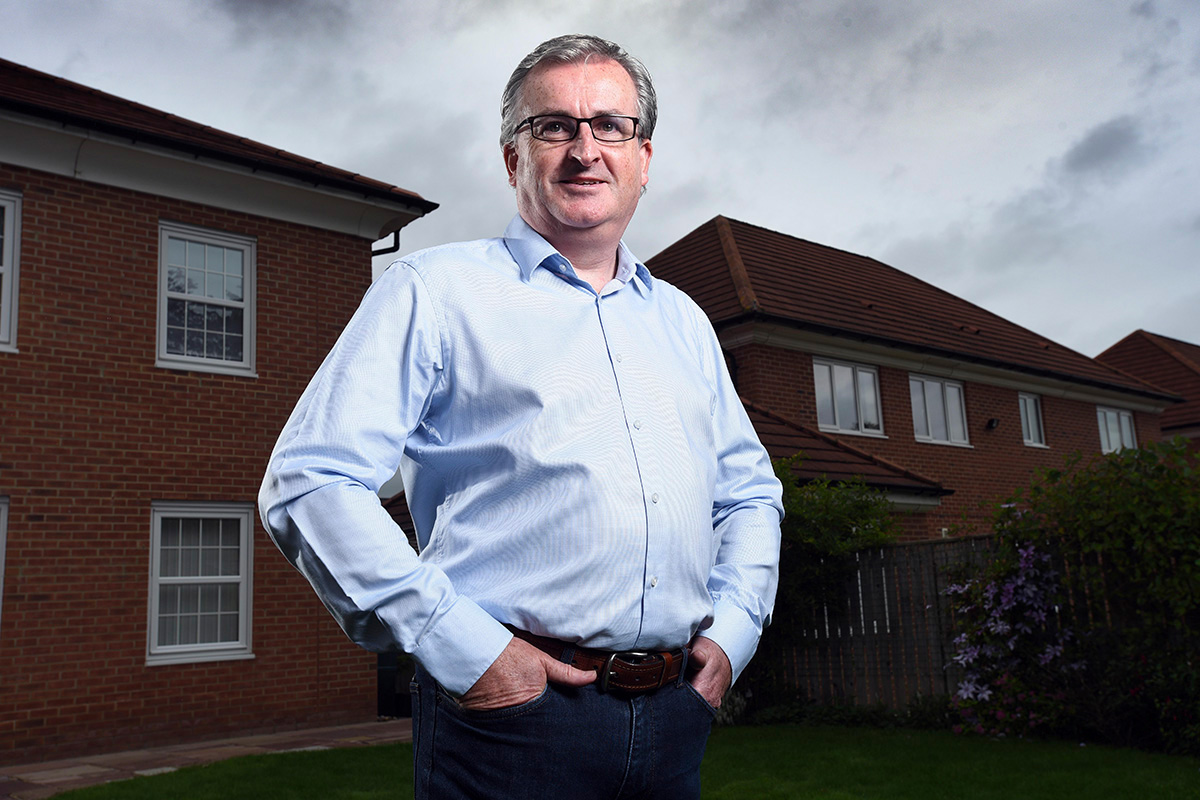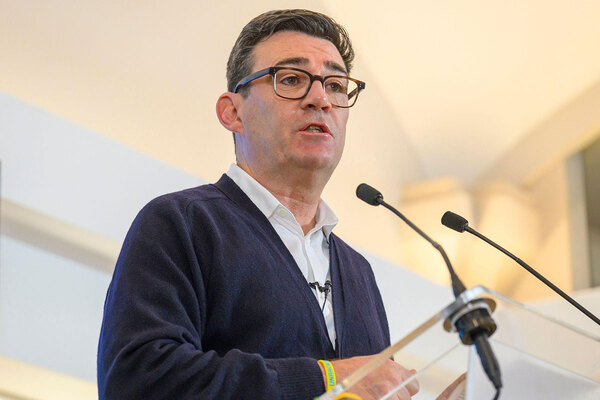You are viewing 1 of your 1 free articles
Meet Richard Cook, Clarion’s construction guru
More than a year after he became development director at the UK’s largest housing association, Clarion’s Richard Cook tells Lucie Heath about everything from Azerbaijan to the lack of commerciality within the social housing sector. Photography by Asadour Guzelian
“Construction is in my blood,” says Richard Cook, group director of development at the UK’s largest housing association, Clarion.
Growing up, his father owned a construction company in the North East of England and from the age of nine, he spent weekends and holidays working there to earn his pocket money.
Mr Cook’s winding career has led him to the affordable housing sector, where he now takes charge of one of the largest development pipelines in circumstances which have never been more challenging.
"With regeneration, it’s not about knocking everything down and moving everybody out, it’s about doing it at a steady pace and relocating people… and that’s what the industry has learned from something like Heygate”
Delivering more than 2,000 homes a year already made Clarion a premier league house builder in the sector, but it has long targeted further expansion. With 17,000 homes in its pipeline, Clarion’s ambitions represent a major plank of not just the sector’s future output, but the country’s ambition to ‘build, build, build’ its way of the coming recession.
Inside Housing caught up with Mr Cook (on Zoom) to discuss how he is developing Clarion’s ambitions to build big and, of course, whether COVID-19 will put a wrench in these plans. But first, how did he get to where he is now?
“I didn’t really know any other career,” says Mr Cook, who studied construction management at Nottingham Trent University. “My son is now 16, he’s got so many more opportunities out there... When I was a child, a lot of people used to fall into the careers that their parents were in.”
Mr Cook has risen to the top of construction. Before joining Clarion at the start of 2019, he enjoyed a long career in the private sector, with roles at organisations such as Taylor Wimpey, Mace and Lendlease.
His career has taken him far from his roots in Darlington. In 2008, as the impact of the financial crash on the UK construction industry was emerging, he moved with his wife and son to Dubai, where he was the project manager on a 110-storey tower.
This move was short lived. “I’d only been there about eight weeks and then Lehman Brothers went bust and everybody suddenly realised Dubai was built upon sand and debt,” he says.
One week, his employer, Mace, was flying in eight new recruits and the next it was laying off 100 members of staff.
“You have to listen to the people, you have to listen to your residents, you have to consult with them and everything else. That has to be done properly”
From there he spent a period in Azerbaijan, before returning to the UK to work with Lendlease on the 2012 London Olympics. “That’s not something you are going to say no to,” he says. “To work on the Olympics in your home country is just fantastic.”
Mr Cook brands his time working as head of design and build delivery on the Athletes’ Village (which was then converted into a residential project) as “the most amazing time of my life” – apart from joining Clarion, he wisely adds.
“It was amazing,” he raves. “It just involved absolute leadership and collaborative working and it really shows what our industry and sector can do if it wants to.”
Mr Cook believes that one of the keys to the success of the project was the simplicity of the politics. “The politics were: it has to be done,” he says.
Politics are typically difficult to avoid when working on high-profile development projects, especially in London. During his time at Lendlease, Mr Cook also worked on the controversial £2.5bn Elephant Park regeneration project in Southwark, which saw the demolition of the iconic Heygate Estate.
“The sector is very much a taker of product. It gets given what it’s given”
Mr Cook admits mistakes were made during the redevelopment of the estate. “The challenge was, it was all decanted and then knocked down. I think everybody’s learned from that. With regeneration, it’s not about knocking everything down and moving everybody out, it’s about doing it at a steady pace and relocating people... and that’s what the industry has learned from something like Heygate.”
However, Mr Cook believes the Elephant Park project has brought many positive things to Southwark and insists that the people who have moved back to the area “love it”. With Clarion involved in a number of large regenerations, what has he learned?
“Redevelopment and regeneration is about being bold,” he adds. “You have to listen to the people, you have to listen to your residents, you have to consult with them and everything else. That has to be done properly.”
Mr Cook is now over a year into his new role at the UK’s largest association. For him, the biggest challenge has been the “lack of commerciality” in the sector.
“The sector is very much a taker of product. It gets given what it’s given,” he says, making specific reference to the process of purchasing Section 106 homes. “That’s what I found when I came in, so we’ve changed that and the way we do business with people.”

This touches on a major concern for the sector at the moment: the quality and safety of the housing it receives from contractors. With a full-scale building safety crisis and many buildings requiring urgent and costly remediation, this is a major headache to say the least.
“The inherent things that have come out of Grenfell, what we’ve got as a business and the rest of the [sector] has got, are underlying quality issues that were never addressed when the projects were built – by the builders who built them, or the consultants who worked on them, or the designers who specified them, and it’s a culture that has to improve,” he explains.
“We are, as clients, becoming more and more demanding about what we expect around quality... Some of the legacy things that are out there in our sector do keep me awake at night, but as an organisation, we’re addressing it”
“Now the last thing in the world we ever wanted was Grenfell – frightening, frightening, frightening. Nothing good comes out of that for the people who were involved in it, but for the industry, my God it was a wake-up call. It made everyone wake up around fire and then other quality issues... The industry is responding, but I don’t think it’s responding quickly enough.
“So we are, as clients, becoming more and more demanding about what we expect out of people around quality... Some of the legacy things that are out there in our sector do keep me awake at night, but as an organisation, we’re addressing it.”
Since joining Clarion, Mr Cook has restructured the development side of the business and placed a stronger focus on risk management.
The volume of development is starting to pick up. In 2019/20, Clarion completed 2,101 homes, which marks a 70% increase on the previous year. Of these, just 14% were for private sale, 883 (42%) were shared ownership, 729 (35%) for affordable rent, and 198 (10%) for social rent.
Mr Cook believes Clarion is now in a strong position. He draws comparisons between the housing association and its “compatriots”, which, he says, were around three years ahead of Clarion in terms of development due to the merger (Clarion was formed in 2016 when Affinity Sutton and Circle Housing merged).
He says other associations “were out there becoming national house builders” without putting the “people, the structure and risk management processes around it”.
“They are the ones who are probably now a little bit more challenged,” he says.
Of course, any development director would be lying if they said 2020 has not been a challenging year. Clarion had originally forecast that it would build 2,800 homes this year, but Mr Cook admits that due to coronavirus he will consider it a good outcome if the landlord meets its 2,101 number from last year.
He says the long-term impact of COVID-19 on the industry is still unknown. “If you talk to anybody – I’ve been on a G15 call today – nobody can tell you,” he says.
Despite the uncertainty, Mr Cook seems outwardly optimistic. “Let’s be honest, the shortage of housing is never going away... our programme is about affordable housing and – being the largest housing association in the country – we are a very big organisation. We are very lucky, we have a very strong balance sheet.”
He says Clarion is still acquiring land and hints that the sector may be seeing a few announcements over the next six months as these deals complete.
Clarion’s development in numbers
125,000
Homes managed
2,101
Homes completed in 2019/20
2,572
Homes started in 2019/20
17,000
Future pipeline
Like the majority of the sector, his number-one ask for the government is clarity in the shape of a long-term grant programme. He says the landlord is currently exploring a potential 10-year project in the North of England, but adds that “to make those investments, as an organisation, you want a level of certainty”.
Clarion is not currently part of Homes England’s strategic partnership programme. Given Mr Cook’s desire for certainty, does he wish the housing association was included in the programme that looks to give landlords long-term flexible grant settlements?
“There’s a real need for rented homes. I would like the current administration to recognise that”
Mr Cook admits Clarion probably didn’t have the “right engagement” with Homes England when he joined last year, describing the relationship as “very transactional”. His team has focused hard on developing a stronger bond over the past year. “I would say from a relationship perspective, we are probably at the point now where we’ve got the same relationship as a strategic partner,” he says.
“I can pick up the phone to Homes England and say, ‘We’re buying this big site, can you help us?’”
When pressed on the current government’s housing policy generally, Mr Cook feels the ongoing focus on homeownership – expressed most clearly in the First Homes policy – could be a mistake.
“There’s a real need for rented homes. I would like the current administration to recognise that,” he responds. “I think they do, but I think there’s still this thing that everything has got to be the answer for homeownership.”
But he is not here to start an argument with ministers. “It’s not our place to be critical of government,” he says.
“What we need to do is to work with whoever is in charge to allow us to deliver on our charitable mission, which is to build homes for the working poor.”
“Clarion is 100 years old,” he continues.
“What we’ve got to do is look after Clarion and make sure Clarion is here for our residents in 100 years’ time. I’ll be gone. My son might have worked for Clarion and moved on, who knows? But Clarion has to be here in some form in 100 years, looking after the people who look after their families.”
See Inside Housing next week for the Biggest Builders Survey 2020, our annual ranking of which associations are developing the most
Sign up to our Best of In-Depth newsletter
We have recently relaunched our weekly Long Read newsletter as Best of In-Depth. The idea is to bring you a shorter selection of the very best analysis and comment we are publishing each week.
Already have an account? Click here to manage your newsletters.
Related stories












